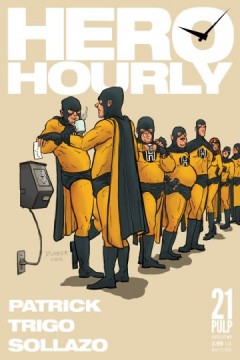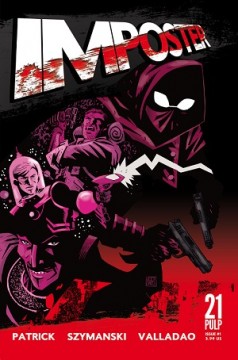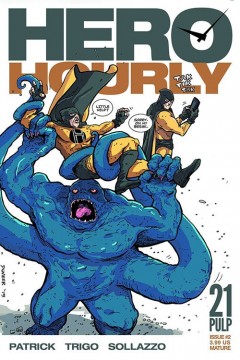“There were things we wanted to accomplish and a way we wanted to do comics!” Jim Patrick on the founding of 21 Pulp and the creation of Hero Hourly and Imposter
 New publishers on the block 21 Pulp, have produced two of our favourite books in recent months – superhero sit com Hero Hourly and twisty turny superhero tale Imposter. Keen to find out more about this fledgling operation we got in touch with writer James Patrick ti find out more about their plans for the future and see if they had any words of wisdom they could share with us.
New publishers on the block 21 Pulp, have produced two of our favourite books in recent months – superhero sit com Hero Hourly and twisty turny superhero tale Imposter. Keen to find out more about this fledgling operation we got in touch with writer James Patrick ti find out more about their plans for the future and see if they had any words of wisdom they could share with us.

James Patrick: 21 Pulp came about during a dinner at Buffalo Wild Wings, of all places. There were things we wanted to accomplish, a way we wanted to do comics, and we put it all into motion.
It’s not mine solely, but I’m a huge part of it. Right now, I’m partially overseeing publishing, the vision of the company, and I’m helping launch things by writing some of the initial books. The other people involved are fans of my work, I have experience publishing and some good writing credentials, so using my books was a good way to get a feel for the process and get the kinks out before bringing in too many other people. Refining the marketing, distribution, printing, production, etc.. But great talent is here and more is coming in all the time. But there are other people than me involved – in both publishing and investing to get this thing off.
On the talent side, we’ve enlisted a lot people already including Carlos Trigo (2000 AD), Jen Hickman (Feathers), Goni Montes (Robocop), Victor Santos (Big Trouble in Little China), and a ton more. It’s a mix of established and up and coming talent.
Both Hero Hourly and Imposter have very strong central promises, how would you pitch each of the stories to new readers?
JP: I always tell people the hook of Hero Hourly and people respond to it quickly. What if being a super hero was looking work a 9 to 5 job that came with minimum wage, lousy bosses, and all the other things people hate. And the cool thing is that they get it. So then you try not to disappoint them with the execution, and that’s where we tell the story of a generation who’s getting out of college and who’s been told they’re awesome their whole life, only to find out that the real world doesn’t agree.
Imposter is a little trickier. It’s hard to tell the premise without giving away the twist of the first issue, but I end up saying to people that there are all these different genre heroes who are connected by a secret, and that it’s a book that has a huge canvas of sci-fi, sorcery, crime, and adventure. The story is about what lies do to a person, and how even the best of intentions can erode a person.

Imposter seems to mix lots of elements from classic superhero stories as well as pulp adventures, so what were the inspirations for the various characters and was it important to use familiar archetypes to help tell the story?
JP: The Centipede is Shadow or Batman, Captain Apex is Buck Rogers, Dr. Oculus is Dr. Strange – and you’re right that the archetypes are on purpose. It allows us to set up a backdrop to tell one story in a whole bunch of different genres.
Hero Hourly has such a different vibe to Imposter, almost like a sit com rather than a comic book, was it intentional that you wanted to do one more humorous and one more serious in tone? Which do you prefer writing?
JP: Yes, Hero Hourly I would say is actually more of a humor book than it is a super hero book, in terms of where the weight is, and I do think that separates it from most books which are action first and then flavored with humor. As for why we chose those two books first, no, it wasn’t because one was this or one was that, but rather of multitude of reasons that just lined up that made us publish those. Hero Hourly wasn’t supposed to be a 21 Pulp book, but when we sitting around a table everyone responded to it, and having a book like that can really stand out. Imposter was always an initial launch book, and HH was more added to the lineup.
You have a couple of running jokes in Hero Hourly – especially Saul’s memories of his family words of wisdom that always happen at inaapropriate times – can you tell us a bit about where that came from? Is that your family?
JP: Ha. Actually, no, none of the “words of wisdom” actually are family or true stories. I think they are just what I thought would be the funniest thing at the time in the context of who Saul’s white, rich parents and his college professors would be.
And are the various running jokes with house mates based on real experiences or tales from friends collected together?
JP: That’s just my demented mind. I don’t think any of the specific roommate characteristics were anything I had a problem with, with the exception of the girlfriend eating all the food. I think anyone who has roommates knows the eating of each other’s food thing, along with finger pointing when it comes to the dishes, is something that always arises.

We also loved the superhero manual in Hero Hourly, is that something you’ve worked out, or did you just include the pages on posing for the purpose of the jokes!
JP: That was a late entry in the story, and I felt it gave it a bit of a smart detail and would work very well visually in comics – an operating manual that was a take on how to do things as a super hero should if they were representing a company. But yeah, I had a job with an operating manual and standard operating procedures, so to speak.
How did you meet up with the artists for each series?
JP: I think I met up with Carlos for Hero Hourly from Digital Webbing. We did that pitch a long time ago, two companies said no, and then I became busy with other things, shelved it, and then, like I said, it was brought up again during an idea session and people really responded.
What about Martin Szymanski, do you ever feel bad about giving him so many different genres to work with? Or was that part of what got him the job?
JP: Martin simply answered an ad we put out for another comic, but when I saw his work, I realized he would be a fit for Imposter and I kept him in my mind for that, and it worked out well. He really needs to be commended on the genre switching. It was asking a lot and he knocked it out of the park. Nah, I never thought feel bad. Ha.
And finally what is next from you and from 21 Pulp and how long will the two series last for?
JP: Next should be Planet of the Dinosaurs, but sometimes things shift. Imposter is four issues to get off the ground, then it can end, or it can spring into a long form format, which is what I’m hoping happens. Hero Hourly is a format that would be multiple mini series, and each one focusing on different characters and different struggles relating to its premise.
We have a lot of great stuff coming, and we are really trying to focus in on the quality of each and every book we put out. To make everything we do top-quality, unique, and one of the best comics you’ll buy that month.
You can get more information from the 21 Pulp website where you can purchase copies of Hero Hourly, Imposter and more!



December 20, 2025 @ 11:28 am
Egal, wo Sie sind, Sie können jederzeit bequem auf Ihre Lieblingsspiele
zugreifen. Die optimierte Mobile-Seite ist für iOS- und Android-Geräte verfügbar und bietet dank der benutzerfreundlichen Oberfläche ein nahtloses
Spielerlebnis. Neue Spieler können sich über einen Willkommensbonus von 400% bis zu 100 Euro
sowie 20 Freispiele für das Spiel Legacy of Dead freuen. Egal, ob Sie klassische Tischspiele oder moderne Slotmaschinen bevorzugen, hier ist für jeden Geschmack etwas dabei.
Zuallererst bietet das Casino eine beeindruckende Auswahl von über
2.000 Spielen von führenden Anbietern.
Es kam auch keine Entschuldigung dazu, dass ich
nicht über das fehlende Dokument informiert wurde.
Bei der zweiten Anfrage einige Stunden später ging es ebenfalls schnell.
Ich habe mein Problem mit der Einzahlung geschildert,
es wurde nachgesehen und dann hieß es, dass alles in Arbeit ist und ich noch Geduld benötige.
Meine ersten Lord Lucky Erfahrungen mit dem Support
waren eigentlich ganz gut. Das war übrigens bei beiden Kontaktaufnahmen der
Fall. Hier hat es nur wenige Sekunden gedauert, bis ich an einen Mitarbeiter
weitergeleitet wurde.
References:
https://online-spielhallen.de/anmeldung-bei-starda-casino-ein-umfassender-leitfaden/
December 27, 2025 @ 4:27 am
This law affects companies within the country, meaning
that online casinos licensed in other jurisdictions outside of Australia can still accept Australian players.
Dive into a universe of captivating slot games, meticulously curated from the finest online casinos around the
world. There are hundreds of safe and fair online pokies in AUS online
casinos, such as Neospin, HellSpin, and SkyCrown.
The competition among these top Australian online casinos ensures that
players have access to innovative gaming experiences and generous
rewards throughout 2025. Understanding the different types of online casino bonuses available can help players make informed
decisions and maximise their gaming experience.
No deposit bonuses are a big one but also reload bonuses and free spins for slots-focused Australian online casinos can make the experience much better for the customer.
The best online casinos in Australia feature a wide selection of high-RTP games, generous bonuses, and fast payouts.
This safe Australian online casino has a Curacao eGaming license.
This includes the A$1,050 Weekend Reload with 50 FS and an interesting 25%
live cashback worth up to A$300 – very cool if you’re into live
dealer games. As a new player at Lunabet, you get a 100% match first deposit
bonus worth up to A$750, combined with 200 free spins and 1 Bonus Crab.
Australians can legally play at offshore licensed casinos.
These casinos have verified licenses, quick payouts, great
pokies, and strict fairness rules.
December 27, 2025 @ 12:52 pm
Upon its release in the United Kingdom, Casino Royale broke series records on both opening day—£1.7 million—and opening weekend—£13,370,969.
The mainland Chinese cut of the film also trims the torture scene and the
stairway fight, as well as a shot of Bond cleaning his wound at the hotel,
and a boat scene. As well as features present from the 2007 release, the collector’s edition contains an audio commentary, deleted scenes, featurettes and a storyboard-to-film comparison. Casino Royale has earned approximately $11.7 million in China
since its opening on 30 January on 468 screens, including a record opening weekend collection for a non-Chinese film,
with $1.5 million.
The title song, “You Know My Name,” performed by Chris Cornell, captures the film’s edgy
and contemporary spirit. David Arnold returned to compose the film’s
score, continuing his work from the previous Bond films.
The opening parkour chase, the high-stakes poker game,
and the dramatic final confrontation in Venice are all
meticulously designed to keep audiences on the edge of their
seats. The action sequences are a testament to the film’s dedication to
delivering high-quality thrills.
References:
https://blackcoin.co/all-caesars-properties-in-las-vegas-2025-list/
December 29, 2025 @ 5:34 am
paypal casino sites
References:
lashnbrow.kr
December 29, 2025 @ 5:52 am
online real casino paypal
References:
https://internship.af/employer/safe-online-gambling-with-paypal/